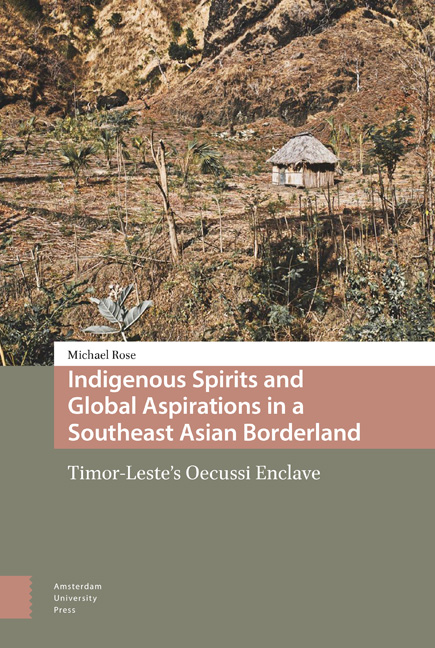 Indigenous Spirits and Global Aspirations in a Southeast Asian Borderland
Indigenous Spirits and Global Aspirations in a Southeast Asian Borderland Book contents
- Frontmatter
- Contents
- List of images
- Map
- A Note On Language
- Acknowledgements
- 1 Frontiers Imagined, Frontiers Observed
- 2 Body and Belief in Timor-Leste
- 3 The Ruin and Return of Markus Sulu
- 4 Angry Spirits in the Special Economic Zone
- 5 Stones, Saints and the ‘Sacred Family’
- 6 Meto Kingship and Environmental Governance
- 7 Ritual Speech and Education in Kutete
- Concluding Thoughts: Encounter, Change, Experience
- Selected Glossary
- Bibliography
- Index
- Miscellaneous Endmatter
Concluding Thoughts: Encounter, Change, Experience
Published online by Cambridge University Press: 21 November 2020
- Frontmatter
- Contents
- List of images
- Map
- A Note On Language
- Acknowledgements
- 1 Frontiers Imagined, Frontiers Observed
- 2 Body and Belief in Timor-Leste
- 3 The Ruin and Return of Markus Sulu
- 4 Angry Spirits in the Special Economic Zone
- 5 Stones, Saints and the ‘Sacred Family’
- 6 Meto Kingship and Environmental Governance
- 7 Ritual Speech and Education in Kutete
- Concluding Thoughts: Encounter, Change, Experience
- Selected Glossary
- Bibliography
- Index
- Miscellaneous Endmatter
Summary
Keywords: Timor-Leste, urbanisation, Oecussi, religious syncretism
Up in the hills of Oecussi, one of the more popular rumours doing the rounds about my presence was that I was there to steal the wealth of the land. Some said I was after gold, others that I was scouting for oil, but Laban, my schoolteacher friend who seemed to get an almost unreasonable amount of delight from passing on what Kutete was saying behind my back, said that many thought I was there to steal words and rituals and sacred narratives. As discussed throughout this book, for most of those with whom I worked, success in the kase realm was obtained and maintained by being in good standing with the ancestral spirits of the meto one, and for that reason, to their way of thinking, the means of interacting it were well worth stealing. Given that plunder had always been the island's main draw for foreigners (its sandalwood trees lathed into fragrant smelling wardrobes, its people sold as slaves in the markets of Makassar and Java) it was easy to see how my claim to be breaking half a millennia worth of precedent in travelling there for strictly selfless purposes was regarded with scepticism. This was reinforced by the categorical fluidity that I found characterized Meto thought – the occasional difficulty of distinguishing clearly between person, object, and place. Yes, my activities mostly involved jotting down words in a notebook, but for my informants those words could be the making or ruin of a person, village, or family. While I have taken care not to include explicitly secret knowledge, the reality remains that like the colonialists who came before me, in this book I too have taken from the pah meto (dry land – West Timor) what I have needed for my own purposes. Given this, I have often wondered whether the suspicions harboured by the people of Kutete about my motivations were not closer to the truth than they seemed at first. At the very least such a situation demanded not just sensitivity, but a well-considered theoretical response.
- Type
- Chapter
- Information
- Indigenous Spirits and Global Aspirations in a Southeast Asian BorderlandTimor-Leste's Oecussi Enclave, pp. 223 - 232Publisher: Amsterdam University PressPrint publication year: 2020


